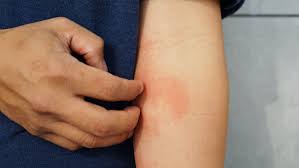What is eczema?
 Eczema is a chronic, itchy skin condition that comes and goes. It affects all ages but is more common in children affecting about 5- 10% of them. Eczema can be mild or it may be more severe and disrupt the lives of those affected and their families. The itching can disturb sleep and make it difficult to concentrate during the day. Eczema is not contagious however the appearance of the skin can make those who have the condition feel embarrassed and isolated.
Eczema is a chronic, itchy skin condition that comes and goes. It affects all ages but is more common in children affecting about 5- 10% of them. Eczema can be mild or it may be more severe and disrupt the lives of those affected and their families. The itching can disturb sleep and make it difficult to concentrate during the day. Eczema is not contagious however the appearance of the skin can make those who have the condition feel embarrassed and isolated.
There are different types of eczema: The commonest is ‘atopic’ eczema. Many patients with atopic eczema may also suffer from asthma and hay fever or have close family members who do. Atopics react in an unusual, exaggerated way to certain things in their surroundings e.g. pollen, feathers and house-dust mites. Although we still do not know exactly why eczema develops in some people, several factors, including genetics and the environment, are involved. The skin of eczema sufferers is more easily damaged by the environment than that of normal people. Stress, intense emotions and contact with irritating substances can make eczema flare up. It is usually possible to avoid some of the things that worsen eczema but this is not always enough. Usually eczema has to be treated with creams and ointments to keep it under control.
There is no permanent cure for eczema but, with correct treatment, the impact on your life can be kept to the absolute minimum. There is no need to put up with constant itching! Consult your doctor or dermatologist about your diagnosis and what treatments might be best for you.
What does eczema look like?
 Eczema causes a red, scaly rash that can be localised or widespread. The skin is usually dry and may be cracked and flaky. Blisters may occur, especially on the hands or sides of the fingers. In severe cases the skin may weep and crust. The main symptom is itching which can be severe. Unfortunately scratching breaks and damages the skin and leaves it open to infection. More than half of those who develop eczema show signs (usually on the face) in their first 12 months; most of the rest will develop it before 5 years of age. Older children get eczema in front of the elbows and behind the knees. Many children with eczema eventually grow out of it.
Eczema causes a red, scaly rash that can be localised or widespread. The skin is usually dry and may be cracked and flaky. Blisters may occur, especially on the hands or sides of the fingers. In severe cases the skin may weep and crust. The main symptom is itching which can be severe. Unfortunately scratching breaks and damages the skin and leaves it open to infection. More than half of those who develop eczema show signs (usually on the face) in their first 12 months; most of the rest will develop it before 5 years of age. Older children get eczema in front of the elbows and behind the knees. Many children with eczema eventually grow out of it.
Clues to diagnosing eczema
- Itchy rash that comes and goes: dry, red, scaly areas on the skin.
- Personal or family history of asthma, hay fever or eczema.
- Eczema usually starts in infancy or early childhood but sometimes starts later.
- In infants and toddlers, eczema usually appears on the face, elbows or knees, but may spread to other areas.
- In older children and adults, eczema appears less often on the face and more commonly on the hands, neck, in front of the elbows, behind the knees and around the ankles.
- Signs of scratching (excoriations) are usual in eczema and are nothing to be ashamed of.
- Lichenification: the skin becomes rough and thickened as a result of chronic scratching.
- Weeping eczema: in severe cases the skin becomes moist, exuding fluid and covered in crusts.
Helping you since 2001
The Malta Eczema Society was set up in 2001 to help those with eczema and their families. The need for such a group in Malta, as found in other countries, had been felt for a long time. The society aims to help by providing support, information and practical advice via public talks and other activities and to increase awareness about eczema and the problems it may cause.
The Malta Eczema Society has also repeatedly lobbied the Maltese Health Authorities regarding entitlement for free medication for eczema sufferers. Until recently, patients with eczema, unlike those with other chronic conditions, were not eligible for any free medication for their condition no matter how severe and chronic it was because eczema was not included in the Schedule V list of chronic diseases. This was very unfair and discriminatory.
We are pleased to note that in 2021 the Schedule V list was amended to include patients with severe chronic forms of eczema. This was a big step in the right direction. However it is disappointing that new effective medications for severe eczema such as dupilumab and JAK inhibitors, which have been used in other countries for several years, are still not available in Malta. It is hoped that these will now become available here too. The MES will continue to insist that available funds should be utilised according to patients’ needs and that patients should not be discriminated according to which chronic disease they are unlucky enough to have. Eczema sufferers pay taxes like everyone else and should be given the assistance they deserve like other patients.
How can you help?
News
& Events
Summer Fundraising Event
Continue reading
